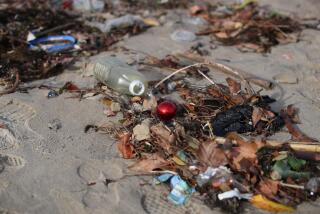Winner Has Science Fairs Down to a Science
Whether she is doing science research, practicing ballet or perfecting flamenco steps, Marin McDonald excels. The 17-year-old Villa Park High senior who has won numerous awards recently was named California Science Student of the Year at the state science fair.
McDonald spent much of the last two years refining her winning project, which studied people’s damaging effects on a type of seaweed that plays an important role in protecting ocean wildlife.
Accompanied by friends or graduate students, McDonald often visited coastal sites in the middle of cold nights during low tide. Wearing a headlamp, she lugged buckets of seawater and bags of a rockweed called Pelvetia compressa, which protects species that live on the ocean bottom.
“In general, where there’s more human use, the damage is worse . . . ,” said McDonald. “It’s so fragile.”
Yet McDonald’s research has not been limited to her more immediate surroundings, or even to the United States. She has also done lab work in a small town in Russia. There, she said, she also learned valuable survival phrases in Russian such as: “I am American,” “Get away from me,” “Where’s the bathroom?,” and “I have no money.”
In the fall, she heads to Stanford University, where she plans to major in biology. An accomplished debater, she also wants to study science communications. McDonald shared her science fair expertise and explained what it takes to win at science competitions.
Question: How did you get the idea for your project?
Answer: My high school science teacher remembered that Dr. Steven Murray, the director of the Coastal Marine Ecology Lab at Cal State Fullerton, had taken another high school science student [under his research wing, which studies human effects on the ocean.]
I had to track Dr. Murray down. When he first took me, he said: “You’re interested in science. I’ve got the resources. I’ll show you what I’ve got.” He helped me structure [the project].
The project has practical applications. I could do it, get the results. This has meaning to people: Look what we’re doing to our coast--this is life, conservation, really meaty things that have importance.
The [rockweed] was picked because it’s a fleshy seaweed, susceptible to effects from trampling. Also it’s exposed during low tide, and it doesn’t recover or reproduce quickly . . . it’s a good indicator because it’s very abundant in Southern California.
Q: What makes for a good science project idea? Does it have to be original?
A: I don’t think originality has a lot to do with it. Good science comes from duplication and repeated tests. . . . [A good idea is] anything that will answer cohesively and concretely with the scientific method a question that we have.
Q: Why don’t other science projects win?
A: It has to do with how you present it. A lot of it is communicating, the style of the project . . . . The emphasis often is to know what [judges] are looking for. They can be capricious. Because your work was sloppy doesn’t mean it was bad.
The judges are really good as methodology goes, but you don’t know what they’re looking for sometimes. They want a good project that’s coherent. They want that you be interested and interesting, that you know how to present data in concise terms. . . . Science is also communicating data as quickly and cohesively as possible. . . .
My project appeals to judges on different levels. It has global importance and significance. . . . It’s not incredibly complex. It’s a very straightforward project, which also has appeal to judges.
Q: How many hours did it take you to complete your project?
A: About 600 hours. . . . It takes a lot of time, getting your presentations down. You have to catch their eye. . . . I’m very animated. . . . I make eye contact, I don’t read from notes. I make my work come alive. . . . I love my project, and I love what I have done and communicate that to judges.
Q. How did researching your project make you a better scientist?
A: I don’t think I had a good idea of what it meant to do science before this project. It means taking work home with you, doing science when you don’t feel like it. It means dedication, perseverance, also a commitment to honesty. You want good science. Your work means nothing if you fudge it. . . .
It’s taught me how to communicate with people who don’t really know what’s going on in my research. You have break it down. It’s taught me how to make it real and tangible for others.
Q: What materials did you use?
A: It was not highly technical. I used buckets, seawater, scissors. The methods of collecting were nothing I couldn’t do myself. It required a lot of manpower. . . . We did experiments on seaweed in plots. Once per month we would visit the plot. It’s an incredible amount of work. . . .
You should go where your heart tells you to go. If you like working with technical stuff, go for it. There’s no limit to what high school students can do.
Q: Do you have advice for other students on how to win at a science fair?
A: Don’t make winning your first goal. I’ve seen that a lot. There are kids in it for the wrong reason. It’s got to be because you love science and love what you’re doing. . . . There’s going to be times when you don’t place. If you only want awards, you’re going to be left with nothing really. It’s very sad.
Emphasize science, explore science, but not to the exclusion of being a person. . . . Take care of yourself, do other things, explore your passions. . . . Ballet helped me in my science a lot. It’s the ultimate in perseverance. . . . I’ve tried not to make my whole life about science.
Q: What did you learn from past competitions?
A: In my first science fair, I had a big board. I thought size was everything. The more I competed, the better I got. . . . The integrity of your research will withstand their inspection. You’ve got to be relaxed when you’re giving your orals to the judges. . . . You’re a high school student talking to a judge at a science fair. Remember it. You’re not in Stockholm presenting a paper.
Q. Why did you enter science fairs?
A: In the beginning I didn’t plan to. I did science research because I wanted to see what it’s like. . . . I could get experience communicating about my work. I want as many people to read it as possible. I wanted to see how far I could take it. I was doing this because I enjoy presenting my work. That’s the goal of science: telling people what we found. . . .
My two loves are public speaking and science . . . but there’s a definite lag between what scientists know and what the public knows. I want to respond to that and help bridge that gap.
Q: What advice did your teachers give you?
A: Don’t give up. . . . If I do this honestly, ethically, something’s got to come. . . . You need to maintain your humanity and not become a science robot, to get enough sleep--you can’t do good science without it.
Q: Do you have any good luck charms you take along to competitions?
A: I have a key chain full of [stuffed] cows. . . . It helps me keep my perspective. . . . You can get so caught up in these competitions. . . . If I win, great, but I if I don’t, life’s not going to end.
Q: How do you plan to spend the $1,000 in award money?
A: On college, definitely. It’s only fair. Every little bit helps for college.






